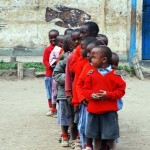Acting Out in The Congo
In the mineral-rich Katangan provincial capital of Lubumbashi, as in many other places throughout the DRC, children often do not have access to education. The costs of supplies, uniforms and other necessities often exceed the limited means of parents who must make decisions about what to prioritize on a daily basis. In some cases, parents feel work is a better way out of poverty than school or that the benefits of education do not merit the investment.
The SFCG-sponsored participatory theater troupe began preparing its performance in Lubumbashi, speaking to community members of the ‘Zambia’ neighborhood in the Rwashi commune about the issues and challenges they face. Through these conversations they learned about the fraught education choices from children both in and out of school. They probed and listened carefully, trying to discover the underlying interests behind these parents’ decisions, and what might spark a change. In their show that afternoon, the actors brought to life the opportunities a child can seize, once he or she has been given the chance to get an education and has a diploma in their hands.
Using its participatory theater techniques, the actors engaged the audience, bringing spectators on stage to replay scenes and influence the outcomes. The actors enabled the audience to see and imagine, possibilities for their own children that education can bring.
A few weeks later, the troupe re-visited the community. Had anything changed? According to the village chief, the performance had touched many parents. Since the performance, he said, many parents had taken to heart the message of the performance, and had put money toward their childrens’ school fees.
During their visit, the troupe was approached by a local vendor who went by the name of Muansa. He told the troupe members that before the performance, he hadn’t thought it was worth it to pay for his children to go to school. He admitted that he would rather use that money to buy a few extra drinks at the end of the week. But the performance changed his mind, and he decided to pay the fees and send his children to school. The ‘Program du Bonne Gouvernance’ (BPG) supports similar theater performances by local troupes in four provinces in the DRC. Last quarter alone over 13,000 people attended these performances. By addressing issues that are close to people’s daily lives, and using the power of theatre to enable people to imagine an alternative future, spectators are often moved to change in their attitudes and behavior.










What a really joy of a blog post…